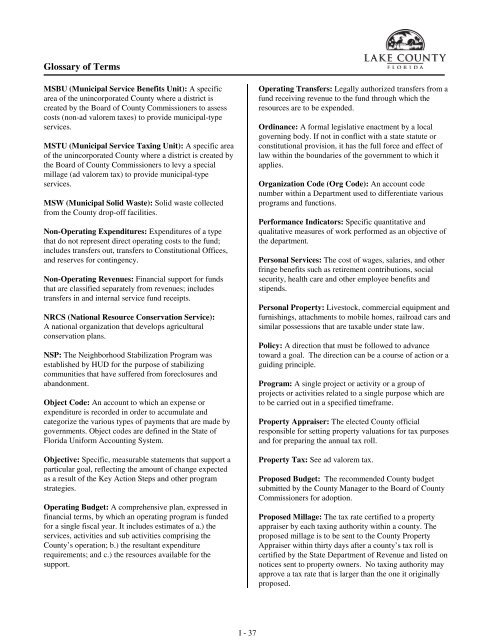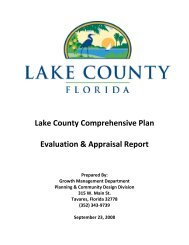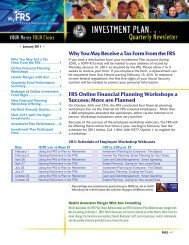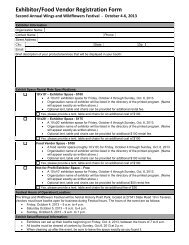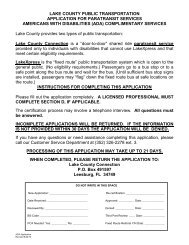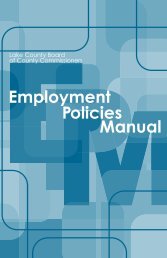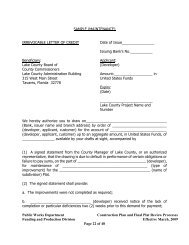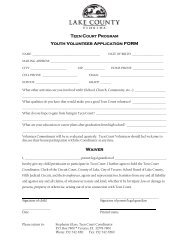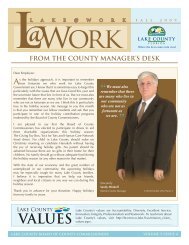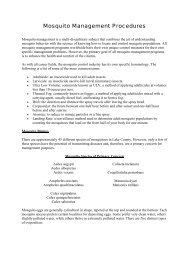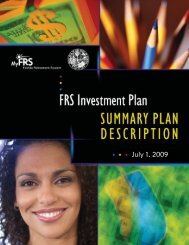- Page 1 and 2:
Lake County, FloridaBoard of County
- Page 3 and 4:
TABLE OF CONTENTSTable of ContentsA
- Page 5 and 6:
TABLE OF CONTENTSE. Budget by Fund
- Page 7 and 8:
F. Operating Budget by Department (
- Page 9 and 10:
F. Operating Budget by Department (
- Page 11 and 12:
TABLE OF CONTENTSH. Capital Improve
- Page 13 and 14:
Honorable Members of the Board of C
- Page 15 and 16:
Honorable Members of the Board of C
- Page 17 and 18:
Honorable Members of the Board of C
- Page 19 and 20:
Honorable Members of the Board of C
- Page 21 and 22:
Honorable Members of the Board of C
- Page 23 and 24:
Honorable Members of the Board of C
- Page 25 and 26:
Honorable Members of the Board of C
- Page 27 and 28:
Honorable Members of the Board of C
- Page 29 and 30:
GeneralLake CountyInformation
- Page 31 and 32:
LAKE COUNTY GOVERNMENTORGANIZATION
- Page 33 and 34:
COUNTY COMMISSION MEMBERS/ELECTED O
- Page 35 and 36:
Commissioner Goals and Focus AreasL
- Page 37 and 38:
County Budget Made Responsibleo In
- Page 39 and 40:
LAKE COUNTY, FLORIDAPer Capita Pers
- Page 41 and 42:
UNITED STATESConsumer Price Index4.
- Page 43 and 44:
Lake CountyChart of Taxable Values
- Page 45 and 46:
Lake County, FloridaComparison of G
- Page 47 and 48:
LAKE COUNTY, FLORIDAClassification
- Page 49 and 50:
LAKE COUNTY, FLORIDAStormwater Mana
- Page 51 and 52:
LAKE COUNTY, FLORIDANon-Ad Valorem
- Page 53 and 54:
Revenues andExpenditures
- Page 55 and 56:
LAKE COUNTY, FLORIDARevenues By Sou
- Page 57 and 58:
General Fund - Revenues and Expendi
- Page 59 and 60:
LAKE COUNTY, FLORIDAGeneral Fund Re
- Page 61 and 62:
Constitutional OfficesJudicial Supp
- Page 63:
TABLE OF CONTENTSSchedulesTable of
- Page 66 and 67:
DepartmentDivision/ProgramCommunity
- Page 68 and 69:
Estimated Fund BalancesFY 2013FundN
- Page 70 and 71:
Reserves and ContingenciesAll Funds
- Page 72 and 73:
Lake County, FloridaGeneral Fund Un
- Page 74 and 75:
Operating BudgetFY 2013RevenuesPark
- Page 76 and 77:
Operating BudgetFY 2013RevenuesRoad
- Page 78 and 79:
Operating BudgetFY 2013RevenuesLawI
- Page 80 and 81:
Operating BudgetFY 2013RevenuesLake
- Page 82 and 83:
Operating BudgetFY 2013RevenuesAffo
- Page 84 and 85:
Operating BudgetFY 2013RevenuesSoli
- Page 86 and 87:
Revenues by FundFundNo.Fund NameAct
- Page 88 and 89:
Expenditures by FundFundNo.Fund Nam
- Page 90 and 91:
C - 28
- Page 92 and 93:
Personnel Authorization SummaryLake
- Page 94 and 95:
Personnel Authorization SummaryLake
- Page 96 and 97:
Position Additions and DeletionsFY
- Page 98 and 99:
Position Additions and DeletionsFY
- Page 100 and 101:
CapitalOutlay
- Page 102 and 103:
Summary of Capital Outlay by FundFY
- Page 104 and 105:
Detail of Capital Outlay by FundFY
- Page 106 and 107:
Detail of Capital Outlay by FundFY
- Page 109 and 110:
Financial StructureCounty’s Organ
- Page 111 and 112:
Budget PoliciesStatutory Requiremen
- Page 113 and 114:
Grant PolicyThe objective of the Gr
- Page 115 and 116:
January 20, 2012 Department Financi
- Page 117 and 118:
TABLE OF CONTENTSBudget by FundTabl
- Page 119 and 120:
Budget by FundFY 2013Actual Adopted
- Page 121 and 122:
Budget by FundFY 2013Actual Adopted
- Page 123 and 124:
Budget by FundFY 2013Actual Adopted
- Page 125 and 126:
Budget by FundFY 2013Actual Adopted
- Page 127 and 128:
Budget by FundFY 2013Actual Adopted
- Page 129 and 130:
Budget by FundFY 2013Actual Adopted
- Page 131 and 132:
Budget by FundFY 2013Actual Adopted
- Page 133 and 134:
Budget by FundFY 2013Actual Adopted
- Page 135 and 136:
Budget by FundFY 2013Actual Adopted
- Page 137 and 138:
Budget by FundFY 2013Actual Adopted
- Page 139 and 140:
Budget by FundFY 2013Actual Adopted
- Page 141 and 142:
Budget by FundFY 2013Actual Adopted
- Page 143 and 144:
Budget by FundFY 2013Actual Adopted
- Page 145 and 146:
Budget by FundFY 2013Actual Adopted
- Page 147 and 148:
Budget by FundFY 2013Actual Adopted
- Page 149 and 150:
Budget by FundFY 2013Actual Adopted
- Page 151 and 152:
Budget by FundFY 2013Actual Adopted
- Page 153 and 154:
Budget by FundFY 2013Actual Adopted
- Page 155 and 156:
Budget by FundFY 2013Actual Adopted
- Page 157 and 158:
Budget by FundFY 2013Actual Adopted
- Page 159 and 160:
Budget by FundFY 2013Actual Adopted
- Page 161 and 162:
Budget by FundFY 2013Actual Adopted
- Page 163 and 164:
Budget by FundFY 2013Actual Adopted
- Page 165 and 166:
Budget by FundFY 2013Actual Adopted
- Page 167 and 168:
Budget by FundFY 2013Actual Adopted
- Page 169 and 170:
Budget by FundFY 2013Actual Adopted
- Page 171 and 172:
Budget by FundFY 2013Actual Adopted
- Page 173 and 174:
Budget by FundFY 2013Actual Adopted
- Page 175 and 176:
Budget by FundFY 2013Actual Adopted
- Page 177 and 178:
Budget by FundFY 2013Actual Adopted
- Page 179 and 180:
Budget by FundFY 2013Actual Adopted
- Page 181 and 182:
Budget by FundFY 2013Actual Adopted
- Page 183 and 184:
F. Operating Budget by Department (
- Page 185 and 186:
F. Operating Budget by Department (
- Page 187 and 188:
Community Services - Organization C
- Page 189 and 190:
Community ServicesLake County Offer
- Page 191 and 192:
Department: Community ServicesProgr
- Page 193 and 194:
Department: Community ServicesDivis
- Page 195 and 196:
Community ServicesKey ObjectivesHea
- Page 197 and 198:
Community ServicesPerformance Measu
- Page 199 and 200:
F - 18
- Page 201 and 202:
Conservation and ComplianceOrganiza
- Page 203 and 204:
Conservation and ComplianceBCC news
- Page 205 and 206:
Department: Conservation and Compli
- Page 207 and 208:
Department: Conservation and Compli
- Page 209 and 210:
Department: Conservation and Compli
- Page 211 and 212:
Conservation and ComplianceKey Obje
- Page 213 and 214:
F - 32
- Page 215 and 216:
County AttorneyOrganization ChartPr
- Page 217 and 218:
County AttorneyActual Adopted Estim
- Page 219 and 220:
Department: County AttorneyProgram:
- Page 221 and 222:
County ManagerOrganization ChartPro
- Page 223 and 224:
County Managermanagement, maintenan
- Page 225 and 226:
County ManagerExpenditures by Divis
- Page 227 and 228:
Department: County ManagerDivision:
- Page 229 and 230:
Department: County ManagerDivision:
- Page 231 and 232:
Reserves for Fiscal Year 2013 inclu
- Page 233 and 234:
County ManagerPerformance MeasuresP
- Page 235 and 236:
F - 54
- Page 237 and 238:
Facilities Development and Manageme
- Page 239 and 240:
Facilities Development and Manageme
- Page 241 and 242:
Department: Facilities Development
- Page 243 and 244:
Department: Facilities Development
- Page 245 and 246:
Facilities Development and Manageme
- Page 247 and 248:
F - 66
- Page 249 and 250:
Growth ManagementOrganization Chart
- Page 251 and 252:
Growth Managementresidential and co
- Page 253 and 254:
Growth ManagementActualFY 2011Adopt
- Page 255 and 256:
Department: Growth ManagementDivisi
- Page 257 and 258:
Department: Growth ManagementDivisi
- Page 259 and 260:
Growth ManagementPerformance Measur
- Page 261 and 262:
Human ResourcesOrganization ChartPr
- Page 263 and 264:
Human ResourcesDepartment Goals and
- Page 265 and 266:
Department: Human ResourcesProgram:
- Page 267 and 268:
F - 86
- Page 269 and 270:
Information TechnologyOrganization
- Page 271 and 272:
Information Technology• The Admin
- Page 273 and 274:
Information TechnologyActualFY 2011
- Page 275 and 276:
Department: Information TechnologyP
- Page 277 and 278:
Department: Information TechnologyD
- Page 279 and 280:
Department: Information TechnologyP
- Page 281 and 282:
Information TechnologyKey Objective
- Page 283 and 284:
F - 102
- Page 285 and 286:
LegislativeOrganization ChartPropos
- Page 287 and 288:
LegislativeActual Adopted Estimated
- Page 289 and 290:
F - 108
- Page 291 and 292:
Public Resources - Organization Cha
- Page 293 and 294:
Public ResourcesSupport Services pr
- Page 295 and 296:
Public Resourcesconsistent with the
- Page 297 and 298:
Department: Public ResourcesProgram
- Page 299 and 300:
Department: Public ResourcesDivisio
- Page 301 and 302:
Capital Improvements for Fiscal Yea
- Page 303 and 304:
Detail of Capital Outlay by FundFY
- Page 305 and 306:
Public SafetyOrganization ChartProp
- Page 307 and 308:
Public Safety• Emergency Manageme
- Page 309 and 310:
Department: Public SafetyProgram: A
- Page 311 and 312:
Communications Technologies - conti
- Page 313 and 314:
Department: Public SafetyDivision:
- Page 315 and 316:
Public SafetyKey ObjectivesPerforma
- Page 317 and 318:
F - 136
- Page 319 and 320:
Public Works - Organization ChartPr
- Page 321 and 322:
Public Worksresponsible for the lan
- Page 323 and 324:
Public Works• The Mosquito and Aq
- Page 325 and 326:
Expenditures by FundActual Adopted
- Page 327 and 328:
Department: Public WorksDivision: E
- Page 330 and 331:
Department: Public WorksDivision: R
- Page 332 and 333:
Federal/State GrantsLAP ProjectsOn
- Page 334 and 335:
Department: Public WorksDivision: S
- Page 336 and 337:
Public WorksKey ObjectivesPerforman
- Page 338 and 339:
Public WorksPerformance MeasuresPer
- Page 340 and 341:
ConstitutionalOffices andJudicialSu
- Page 342 and 343:
Constitutional OfficesActual Adopte
- Page 344 and 345:
A summary of the FY 2013 transfer t
- Page 346 and 347:
Department: Constitutional OfficesO
- Page 348 and 349:
Department: Constitutional OfficesO
- Page 350 and 351:
Judicial SupportOrganization ChartP
- Page 352 and 353:
Department: Judicial SupportDivisio
- Page 354 and 355:
Department: Judicial SupportProgram
- Page 356 and 357:
Department: Judicial SupportDivisio
- Page 358 and 359:
Fund/Department/Division Org Code N
- Page 360 and 361:
OtherOperatingBudgets• Debt Servi
- Page 362 and 363:
Debt Service - continuedThe second
- Page 364 and 365:
F - 182
- Page 366 and 367:
General Fund Non-DepartmentalActual
- Page 368 and 369:
Infrastructure Sales Tax Non-Depart
- Page 370 and 371:
Lake County Ambulance - continuedTr
- Page 372 and 373:
TABLE OF CONTENTSInternal Service F
- Page 374 and 375:
CountyManager
- Page 376 and 377:
County ManagerActual Adopted Estima
- Page 378 and 379:
County ManagerKey ObjectivesPerform
- Page 380 and 381:
HumanResources
- Page 382 and 383:
Human ResourcesActual Adopted Estim
- Page 384 and 385:
Department: Human ResourcesProgram:
- Page 386 and 387:
Non-Departmental
- Page 388 and 389:
Non-DepartmentalExpenditures by Div
- Page 390 and 391:
TABLE OF CONTENTSCapital Improvemen
- Page 392 and 393:
FacilitiesDevelopment andManagement
- Page 394 and 395:
Facilities Development and Manageme
- Page 396 and 397:
Department: Facilities Development
- Page 398 and 399:
Non-Departmental
- Page 400 and 401:
Non-DepartmentalExpenditures by Cap
- Page 402 and 403:
Detail of Capital Outlay by FundFY
- Page 404 and 405:
PublicResources
- Page 406 and 407:
Public ResourcesExpenditures by Cap
- Page 408 and 409:
Department: Public ResourcesPublic
- Page 410 and 411:
Public Safety
- Page 412 and 413:
Public SafetyExpenditures by Capita
- Page 414 and 415: Public Works
- Page 416 and 417: Public WorksExpenditures by Capital
- Page 418 and 419: Detail of Capital Outlay by FundFY
- Page 420 and 421: CapitalImprovementsby Fund
- Page 422 and 423: Fund/Department/Division Project To
- Page 424 and 425: Detail of Capital Improvements by F
- Page 426 and 427: Detail of Capital Improvements by F
- Page 428 and 429: H - 38
- Page 430 and 431: I - 2
- Page 432 and 433: Supplemental Information and Demogr
- Page 434 and 435: Supplemental Information and Demogr
- Page 436 and 437: I - 8
- Page 438 and 439: OPEN PURCHASE ORDERS EXCLUDING BLAN
- Page 440 and 441: OPEN PURCHASE ORDERS EXCLUDING BLAN
- Page 442 and 443: OPEN PURCHASE ORDERS EXCLUDING BLAN
- Page 444 and 445: OPEN PURCHASE ORDERS EXCLUDING BLAN
- Page 446 and 447: OPEN PURCHASE ORDERS EXCLUDING BLAN
- Page 448 and 449: OPEN PURCHASE ORDERS EXCLUDING BLAN
- Page 450 and 451: OPEN PURCHASE ORDERS EXCLUDING BLAN
- Page 452 and 453: OPEN PURCHASE ORDERS EXCLUDING BLAN
- Page 454 and 455: OPEN PURCHASE ORDERS EXCLUDING BLAN
- Page 456 and 457: OPEN PURCHASE ORDERS EXCLUDING BLAN
- Page 458 and 459: OPEN PURCHASE ORDERS EXCLUDING BLAN
- Page 460 and 461: I - 32
- Page 462 and 463: Glossary of TermsCash Basis: A basi
- Page 466 and 467: Glossary of TermsProprietary Fund:


